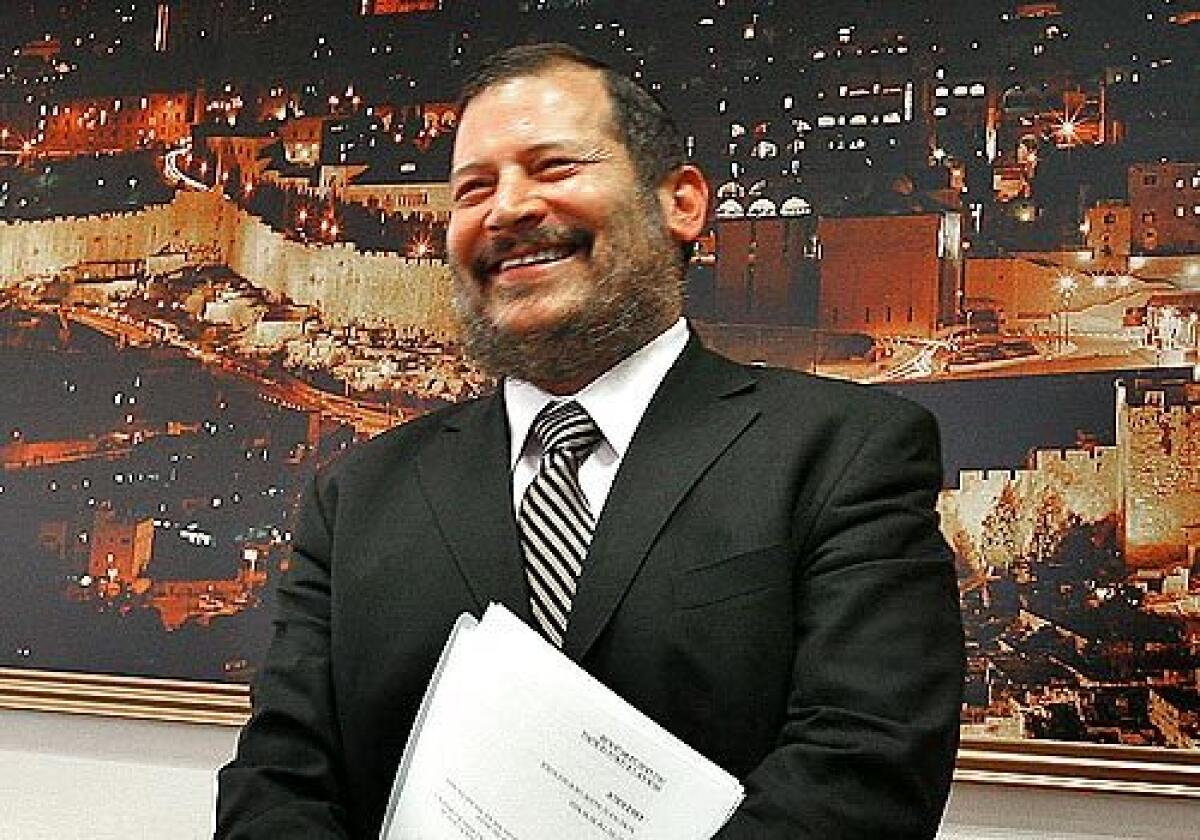Mayor focuses on budget, not barricades

- Share via
JERUSALEM — The first ultra-Orthodox mayor of Jerusalem has a genial, low-key manner that even many of his foes find likable.
Since riding a near-sweep among devout Jews to win election four years ago, the 55-year-old rabbi has avoided direct confrontation with less religious residents over hot-button issues such as closing restaurants or key streets on the Jewish Sabbath.
By focusing on the city budget more than the barricades, Uri Lupolianski’s administration has tried to address what it considers the long-neglected needs of the ultra-Orthodox, or haredim, for more schools, synagogues, yeshivas and playgrounds.
He also has won some praise for defusing tensions with the city’s Arab population.
“It is my job to ensure that everybody can dance their own dance in Jerusalem, as long as they don’t step on somebody else’s toes,” Lupolianski said in an interview.
Critics question whether Lupolianski has the vision to solve the problems of this volatile city. They say he seems untroubled that many less devout Jews are leaving the city, in part because of the growth of the haredi population and its increased political clout.
“He’s a smiley guy, nice guy,” said City Council member Nir Barkat, who lost the 2003 mayor’s race to Lupolianski. “However, [during] some of the first meetings I had in the municipality, I asked: ‘What is the vision? Where are the plans?’ ”
Lupolianski avoids national issues, unlike his predecessor, Ehud Olmert, who is now Israel’s prime minister. Asked whether Jerusalem should be divided to make peace with the Palestinians, he responded, “As mayor, I am not interested in giving declarations on the subject.”
Lupolianski, who has 12 children, was long familiar to many Israelis as the founder of Yad Sarah, which lends free medical equipment to the public. The charity was named after his grandmother, who died during the Holocaust.
Deputy Mayor Uri Maklev, who also is ultra-Orthodox, said Lupolianski had been an able problem solver, tackling budget shortfalls, for example, through belt-tightening that included layoffs of 1,000 city employees.
Haredi backers generally appear satisfied.
“Part of his success is that there haven’t really been any big issues on his watch, any big clashes,” said Mordecai Plaut, who formerly edited the English edition of Yated Neeman, a haredi newspaper.
Detractors say Lupolianski lacks a strategy for fighting poverty that is aggravated, in part, by the growing ranks of haredi Jews, who tend to be poorer.
Gay-rights activists accuse Lupolianski of fanning bias by opposing gay-pride parades. In 2005, an ultra-Orthodox protester stabbed three marchers after Lupolianski sought unsuccessfully to block the parade. Some Jewish, Christian and Muslim clerics had said the event would insult the sensibilities of a sacred city.
Although the mayor denounced the stabbings, Saar Nathaniel, the City Council’s only openly gay member, charged that the mayor had “put oil on the fire.”
This year Lupolianski defused tensions over Israeli excavation near the contested holy site known to Jews as the Temple Mount and to Muslims as Haram al Sharif. The digging, in preparation for repairs to a ramp leading to the hilltop site, sparked protests by Muslims who said Israel was undermining the mosque complex.
Lupolianski ordered the repair plans submitted to a review panel for public comment.
“What’s been proven here,” Lupolianski said, “is that a haredi mayor is not unsuitable in any way.”
ellingwood@latimes.com
More to Read
Sign up for Essential California
The most important California stories and recommendations in your inbox every morning.
You may occasionally receive promotional content from the Los Angeles Times.













